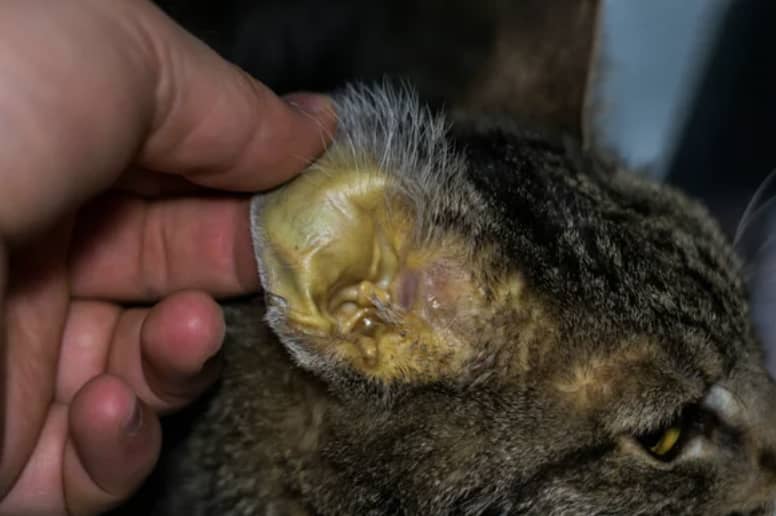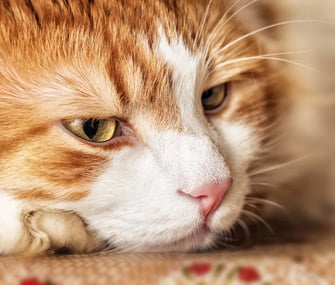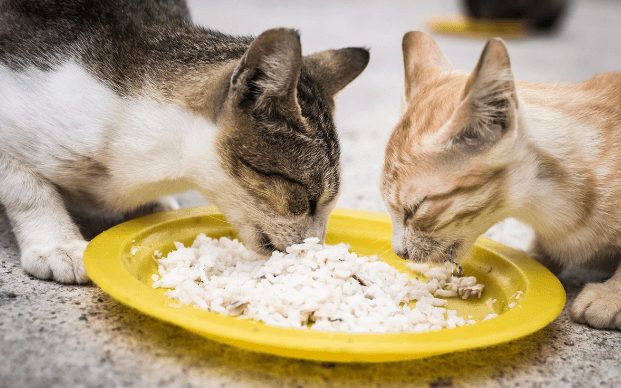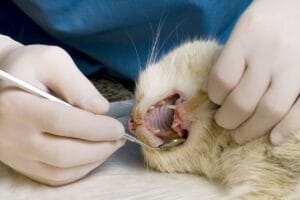Home Treatment for Cats with Liver Disease

Do you want some free treatment tips and home remedies for Cats with liver disease?
Liver disease is a common ailment that can affect cats of any age or breed. There are various types of liver diseases that can be caused by a number of factors, including infections, toxins, and poor diet. If your cat is diagnosed with liver disease, it is important to seek veterinary care immediately to identify the type and severity of the issue.
However, there are also some natural remedies and lifestyle changes that can help support your cat’s liver health and aid in their recovery. Especially in the cases where the severity of the problem is quite low, or in its early stages. We will be discussing these techniques and remedies in this article.
But first, let’s better understand what Liver Disease is, its effect on cats, and its diagnoses.
What is Liver Disease in Cats?
Liver disease in cats, also known as feline hepatic disease, refers to any condition that impairs the proper function of the liver. The liver is a vital organ that performs several critical functions, including detoxifying the blood, synthesizing proteins, producing bile, and storing vitamins and minerals. Therefore, any damage to the liver can have severe consequences for a cat’s overall health.
Types of Liver Disease in Cats:
There are several types of liver disease that can affect cats. Some common ones include:
- Hepatitis: Inflammation of the liver caused by viral or bacterial infections, toxins, or an immune system disorder.
- Fatty liver disease: Also known as hepatic lipidosis, this condition is caused by the accumulation of excess fat in the liver, leading to liver failure.
- Hepatic lipidosis: A condition in which the liver cannot properly process fats. This leads up to the buildup of fat in the liver.
- Liver cancer: The abnormal growth of liver cells that can spread to other organs.

Symptoms of Liver Disease in Cats:
The symptoms of liver disease in cats can vary depending on the type and severity of the condition. Some common symptoms include:
- Jaundice: Jaundice is a yellowing of the skin, eyes, and mucous membranes caused by an excess of bilirubin in the blood. Bilirubin is a yellow pigment that is produced by the liver when it breaks down old red blood cells. When the liver is not functioning properly, it may not be able to process bilirubin, resulting in jaundice.
- Vomiting and diarrhea: Liver disease can cause gastrointestinal symptoms, including vomiting and diarrhea. These symptoms can be caused by a build-up of toxins in the bloodstream that the liver would normally filter out.
- Weight loss: Liver disease can cause a cat to lose weight rapidly. This can be due to a loss of appetite or malabsorption of nutrients from food.
- Increased thirst and urination: Liver disease can cause a cat to drink and urinate more than usual. This is because the liver plays a role in regulating the body’s water balance.
- Ascites: Ascites is a build-up of fluid in the abdomen. It can be caused by liver disease because the liver is responsible for producing proteins that help regulate fluid balance in the body.
- Hepatic encephalopathy: Hepatic encephalopathy is a brain disorder that can be caused by liver disease. It occurs when toxins that are normally filtered out by the liver build up in the bloodstream and affect brain function. Symptoms of hepatic encephalopathy include disorientation, circling, and seizures.
- Lethargy: Cats with liver disease may become lethargic and lose interest in activities they once enjoyed.

Diagnosing Liver Disease in Cats:
Diagnosing liver disease in cats involves a physical exam, blood tests, imaging studies, and a biopsy. During a physical exam, the vet will look for signs of jaundice, abdominal swelling, and other symptoms of liver disease. Blood tests can check liver enzyme levels, bilirubin levels, and the levels of other blood components.
Imaging studies such as ultrasound, CT-scan, or MRI can provide detailed images of the liver and help identify any abnormalities. A biopsy involves taking a sample of liver tissue and examining it under a microscope to check for signs of disease.
After the diagnostic tests, the veterinarian will evaluate the results and make a diagnosis. Based on the severity of the liver disease, treatment options will be recommended. Treatment may involve medication, dietary changes, and in some cases, surgery.
In this article we will mainly be focusing on home treatment options. Please note that home treatment for cat liver disease should only be considered for mild cases, and severe cases require immediate medical attention from a licensed veterinarian. If you are pursuing home treatment options for cats liver disease, regular checkups and consultations with your vet are essential. This is to ensure your cats condition is not deteriorating.

Home Treatment for Cats with Liver Disease
Here are 7 great remedies for home treatment of cats with liver disease.
Diet and Nutrition:
A well-balanced, nutritious diet is critical for cats with liver disease. It is essential to provide your cat with a diet that is low in carbohydrates and high in protein. Protein is essential for cats with liver disease as it helps to reduce the workload on the liver.
However, not all proteins are the same, and it is important to avoid red meats, which are harder to digest. Fish and chicken are better options. In addition to that, cats with liver disease often have poor appetites, and they may need smaller, more frequent meals throughout the day. A veterinary nutritionist can help you develop a specific diet plan that caters to your cat’s individual needs.
If you are interested in learning how to make the homemade foods for cats with liver disabilities, follow this link.
Herbal Supplements:
Certain herbs can support liver health in cats, and they have been used for centuries to treat liver disease. Milk thistle is the most commonly used herb and has been shown to protect the liver from damage and aid in its repair.
Other beneficial herbs include dandelion root, burdock root, and turmeric. However, it is important to note that not all herbal supplements are effective, and some may even be harmful to cats. It is important to consult with a veterinarian before giving your cat any herbal supplements to ensure that they are safe and effective.
Fluid Therapy:
Dehydration is a common complication of liver disease in cats, and it can lead to serious health problems. Providing your cat with fresh, clean water at all times is crucial. If your cat is not drinking enough water on their own, your veterinarian may recommend fluid therapy. Fluid therapy is a way of delivering fluids, nutrients, and electrolytes directly into the cat’s bloodstream through an IV. This helps to keep the cat hydrated and improve liver function.
Environmental Management:
Exposure to toxins in the environment can exacerbate liver disease in cats, and it is essential to minimize your cat’s exposure to environmental toxins. This can be achieved by using natural cleaning products, avoiding cigarette smoke, and keeping their living area clean and well-ventilated. Additionally, providing your cat with a stress-free environment can help support their liver function. Stress can trigger inflammation and exacerbate liver disease.
Acupuncture:
Acupuncture is a traditional Chinese medicine technique that involves inserting fine needles into specific points on the body to stimulate healing. The Acupuncture treatment can help to improve blood flow, reduce inflammation, and improve the overall function of the liver. It is essential to seek out a licensed veterinary acupuncturist to ensure that the procedure is safe and effective.
Massage Therapy:
Massage therapy is another technique that can be beneficial for cats with liver disease. A massage treatment can help to improve blood flow, reduce inflammation, and promote relaxation. This, in turn, can help to support liver function. It is important to seek out a licensed veterinary massage therapist to ensure that the procedure is safe and effective.
Milk Thistle:
Milk thistle is an herb that has been used for centuries to treat liver problems in both humans and animals. This herb contains a compound called silymarin, which is known for its antioxidant and anti-inflammatory properties. Silymarin helps protect the liver by preventing toxins from entering liver cells and promoting the regeneration of damaged liver tissue. It has been shown to be particularly effective in treating liver diseases such as cirrhosis and hepatitis.
Before giving your cat milk thistle, it is important to consult with your veterinarian to determine the appropriate dosage and ensure that it is safe for your cat. Milk thistle supplements come in various forms, such as capsules, tablets, and liquids. Your veterinarian may recommend a specific brand or form that is appropriate for your cat’s individual needs.
BONUS: Other Nutrients and Vitamins:
In addition to milk thistle, there are other nutrients and vitamins that can be beneficial for cats with liver disease. Vitamin E, for example, is an antioxidant that helps protect the liver from damage caused by free radicals. It also supports immune function and helps regulate inflammation.
Vitamin K is another important nutrient that plays a role in blood clotting and can be helpful in cases of liver disease where there is a risk of bleeding. Omega-3 fatty acids, found in fish oil and other supplements, can also help reduce inflammation and improve liver function.
As with milk thistle, it is important to consult with your veterinarian before giving your cat any supplements or vitamins to ensure that they are safe and effective. Your veterinarian can recommend specific products and dosages that are appropriate for your cat’s individual needs.
Conclusion
In summary, home treatment options for liver disease in cats can be an effective way to complement veterinary care and promote the overall health of your feline friend. Proper diet and nutrition, herbal supplements, fluid therapy, and environmental management can all play an important role in supporting liver function and aiding in recovery. However, it is important to keep in mind that home treatment options are not a substitute for professional medical care, especially in severe cases of liver disease.
It is essential to consult with your veterinarian before implementing any home treatment methods. Your vet can help you determine the best course of action for your cat’s specific needs and monitor their progress. They can also provide guidance on which home treatments are most effective for the type of liver disease your cat has, as some methods may work better for certain types than others.


